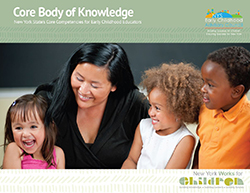Core Body of Knowledge
NY's Core Competencies for Early Childhood Educators
Navigation

CB
Core Beliefs
Several core beliefs served as the foundation for the writing of this document and exist at the heart of all seven of the competency areas
Core Beliefs
CB-1
Core Belief 1
Children are born ready to learn.
CB-2
Core Belief 2
Every human being is a unique individual, with diverse modes of learning and expression as well as interests and strengths.
CB-3
Core Belief 3
Children are worthy of the same respect as adults.
CB-4
Core Belief 4
Children's needs for shelter and for physical, intellectual, emotional, and social nourishment must be met for them to grow, develop, and learn to their fullest potential.
CB-5
Core Belief 5
Children have the right to secure, trusting relationships with adults and to safe, nurturing environments
CB-6
Core Belief 6
Children learn through play.
CB-7
Core Belief 7
Children construct their own knowledge based on their curiosity and driven by their interactions. This active construction is facilitated by interaction with adults and other children.
CB-8
Core Belief 8
Children's learning is active and follows a recurring path: awareness, exploration, inquiry and application.
CB-9
Core Belief 9
Children learn best when exposed to and engaged in high-quality environments, interactionsm, and relationships.
CB-10
Core Belief 10
Children learn best when adults in their lives work in partnership with one another.
CB-11
Core Belief 11
All children and their families, regardless of their ethnic origins, value systems, faiths, customs, languages, and compositions, must be equally respected.
CB-12
Core Belief 12
Families and children have the right to support systems that foster their growth and development.
CB-13
Core Belief 13
Teaching and learning are dynamic, integrated, and reciprocal processes.
Resources for Core Beliefs
No resources available for Core Beliefs

